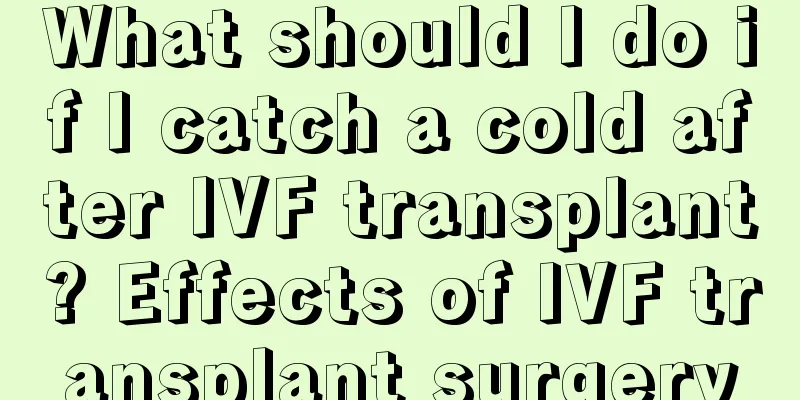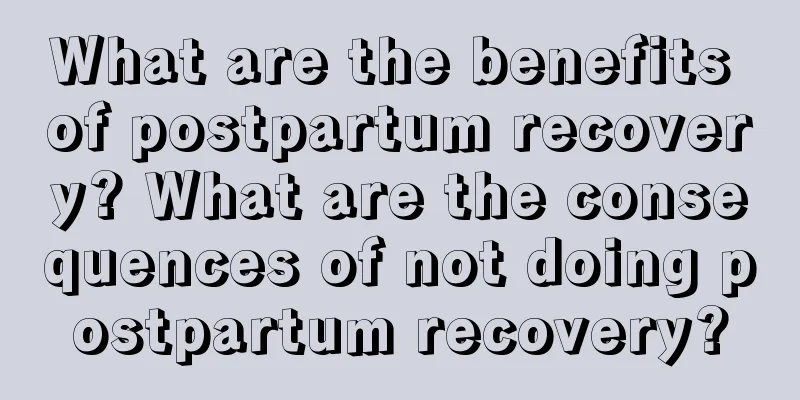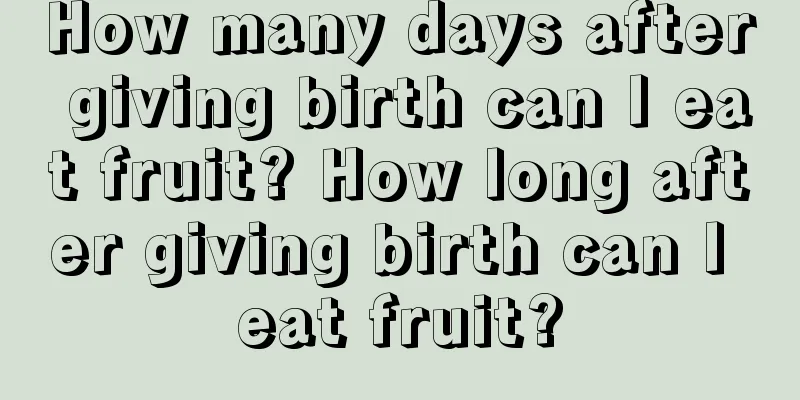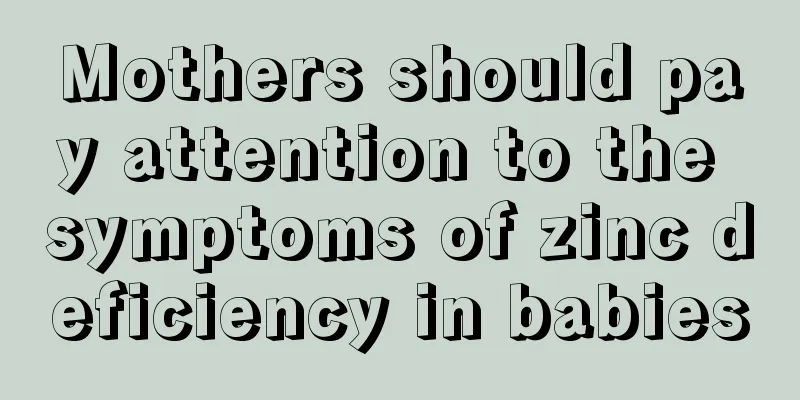What should I do if I catch a cold after IVF transplant? Effects of IVF transplant surgery

|
After IVF transplantation, many women have lost their dream of becoming a mother. But what if you catch a cold after IVF transplantation? Can you take medicine? What are the effects of IVF transplantation? Let's learn about it together~ Thanks to IVF technology, many infertile women can now have their own children. However, a cold in pregnant women may affect the fetus. Therefore, you should try to avoid catching a cold during pregnancy. Now let's see what to do if you catch a cold after IVF? What to do if you catch a cold after IVF1. Do not take medicine on your own: If a patient catches a cold after IVF transplantation, the patient must not take medicine on his own, as some cold medicines contain antibiotics, which can have a great impact on the embryo. 2. If you have a cold but no fever, but have mild cold symptoms such as headache, sneezing, runny nose, etc., it is recommended to observe first, which will not have any effect on the fetus. You should drink more water and get enough rest. If the body temperature rises above 38 degrees, it is recommended to consult the attending physician and take medicine according to the symptoms. 3. If the cold is severe, consult your doctor immediately. How to deal with a cold after IVFGetting sick during pregnancy has a greater impact on the fetus, especially after IVF transfer, special attention should be paid. So, what should pregnant women do if they have a cold and stuffy nose? It is better to use folk remedies to treat colds than taking medicine during pregnancy. It has no effect on the child and is safe and reliable. Here are some treatment methods for pregnant women to treat colds. 1. Cook ginger with cola: Take about 20 to 30 grams of fresh ginger, peel and mash it, then put it into a large bottle of cola, boil it in a soup pot, and wait for it to cool down for a while before drinking. This recipe has the effect of treating cough and promoting sweating, and is best for treating colds. 2. Sesame oil with eggs: Heat one or two sesame oils and beat them into the beaten eggs. Then pour in boiling water and stir evenly. Take it while it is hot, once in the morning and once in the evening for 2 to 3 days. This recipe has the effect of treating dry cough and lubricating the respiratory tract. 3. Take honey with water: Honey contains a variety of biologically active substances, which can stimulate the body's immune function. Taking it twice a day, morning and evening, can effectively treat and prevent colds and other viral diseases. 4. Drink sugar ginger tea: Colds are mostly caused by external wind and cold, and often have symptoms such as headache, nasal congestion, runny nose, joint pain, and even fear of cold and fever. You can use brown sugar, ginger, and black tea in appropriate amounts, boil them into soup and drink it 1-2 times a day. It not only warms the body and removes cold, but also has a good function of preventing and treating colds. 5. Orange peel water: add appropriate amount of fresh orange peel (half of the orange peel will do), add 3 cups of water (ordinary disposable paper cups), boil it into 2 cups, add appropriate amount of sugar and drink it directly. This recipe can eliminate phlegm and treat cough. 6. Chicken soup: Drinking chicken soup can relieve symptoms such as nasal congestion and runny nose during a cold, and it is also effective in clearing respiratory viruses. Drinking chicken soup regularly can enhance the body's natural resistance and prevent the occurrence of colds. Adding some pepper, ginger and other condiments to the chicken soup, or eating it with noodles, can cure colds. 7. Scallion and fermented black bean soup: 30 grams of scallion with roots, 10 grams of fermented black beans, 3 slices of ginger, add 500 grams of water and boil, then add 30 grams of rice wine, drink it hot, cover with a blanket to sweat. Effects of IVF transplantationGenerally speaking, IVF transplantation technology is safe, but some complications may occur and require special attention. 1. Ovarian Hyperstimulation Syndrome Due to the growth of multiple follicles, some factors in the body change, causing the fluid in the blood vessels to leak into the abdominal cavity, or even into the chest cavity, causing pleural effusion. The incidence rate is about 10%. Most people have mild symptoms, such as abdominal distension, abdominal discomfort, and mild nausea, which can be left untreated; but a few people will experience severe abdominal distension, oliguria, abdominal pain, poor appetite, and even chest tightness and shortness of breath. At this time, intravenous rehydration is required, and even hospitalization is required. Less than 1% of people may develop thrombosis or renal failure. 2. Side effects caused by egg retrieval ① In case of bladder injury, the patient may have hematuria. Usually, the bleeding can be stopped by placing a urinary catheter and flushing the bladder. ②Occasionally, the intestine or pelvic blood vessels may be punctured. ③ Ovarian bleeding: In a few cases, the punctured ovary will continue to bleed, and sometimes even laparotomy is required to stop the bleeding. ④ Pelvic infection 3. Ovarian torsion Because ovulation induction treatment causes multiple follicles to grow, or multiple corpus luteum cysts to form after egg retrieval, the ovaries are significantly enlarged. At this time, when women are overactive or change their posture too quickly, it can cause ovarian torsion. Patients will experience sudden severe abdominal pain, which may be accompanied by nausea and vomiting. If the twisted ovary cannot be reset in time, surgical treatment may be required. In severe cases, surgical removal of the necrotic ovary is required. 4. Multiple pregnancy Since multiple embryos are transplanted into the uterus, the multiple pregnancy rate caused by IVF transplantation technology is significantly higher than that of natural pregnancy, which is about 25-30%. The risk of late miscarriage and premature birth in multiple pregnancies is significantly higher than that of single pregnancies, and the mother's risk of gestational diabetes, gestational hypertension, dystocia and postpartum hemorrhage is significantly increased. Therefore, multiple pregnancies are not good for both mother and child. At present, many IVF transplantation centers have begun to reduce the number of transplanted embryos or perform single embryo transplants in order to reduce the multiple pregnancy rate. For those who are pregnant with three or more fetuses, fetal reduction must be performed, while for those who are pregnant with twins, patients are advised to reduce fetal reduction. 5. Ectopic pregnancy The incidence of ectopic pregnancy in the general population is 1%-2.5%. Although the IVF transplantation operation is to transplant the embryo into the uterus, due to the influence of the fallopian tube chemokine on the embryo, the embryo will migrate into the fallopian tube, implant and develop in the fallopian tube, causing an ectopic pregnancy. Sometimes the embryo will also be implanted in the cervix and other parts. Therefore, receiving IVF transplantation surgery cannot prevent the occurrence of ectopic pregnancy. On the contrary, the incidence of ectopic pregnancy in women who receive IVF transplantation surgery is higher than that of the general population, at 2%-4%. 6. Safety of offspring produced by IVF transplantation technology Some literature reports that IVF transplant surgery may increase the incidence of certain types of birth defects, while some literature has no similar findings. In general, the incidence of birth defects in offspring born from IVF transplant surgery is very low, about 2-4%. |
>>: What tests are needed before artificial insemination? When is artificial insemination?
Recommend
How can parents stop their children from making noise in public?
Many parents do not like to take their children t...
Can pregnant women eat lotus seeds? Can I eat lotus seeds during confinement?
Now is the time when lotus seeds are on the marke...
Why do children often cough? What should I do if my child often coughs?
Coughing is a very uncomfortable state. Why do ch...
Will pregnant women gain weight due to edema? How long will it take for pregnant women to recover from edema?
Many mothers will experience edema in the late st...
What is the reason for frequent spitting up of babies? What should I do if my baby frequently spits up?
Usually, babies who have just been born need to d...
At what age does a child enter the rebellious period? How should a child be guided during the rebellious period?
The rebellious period has become an indispensable...
Which month of pregnancy is the most unsafe? It's not the first three months
After pregnancy, expectant mothers are often very...
Does Dinggui baby navel patch have any side effects? What are the hazards of Dinggui baby navel patch?
Usually babies' stomachs are very fragile, so...
What are the symptoms of early pregnancy and how to check whether you are pregnant
Do you know anything about pregnancy in your life...
Is it necessary to buy a pregnancy pillow? Which shape of pregnancy pillow is the most practical?
Most pregnant women know that it is very inconven...
How is the quality of Mama's Choice laundry detergent? Is Mama's Choice laundry detergent easy to use?
Nowadays, most people use laundry detergent to wa...
Is infantile hemangioma easy to treat? What are the dangers of hemangioma?
Hemangioma sounds like a very serious disease. He...
Can I eat green dates during confinement? Can I eat green dates during confinement?
The nutritional value of green dates is not infer...
Is pregnancy oil useful for stretch marks? How to reduce stretch marks
Pregnancy oil is a very common product on the mar...
What to do if your baby has a poor memory? Improve your memory
Children memorize books for exams but still can&#...









